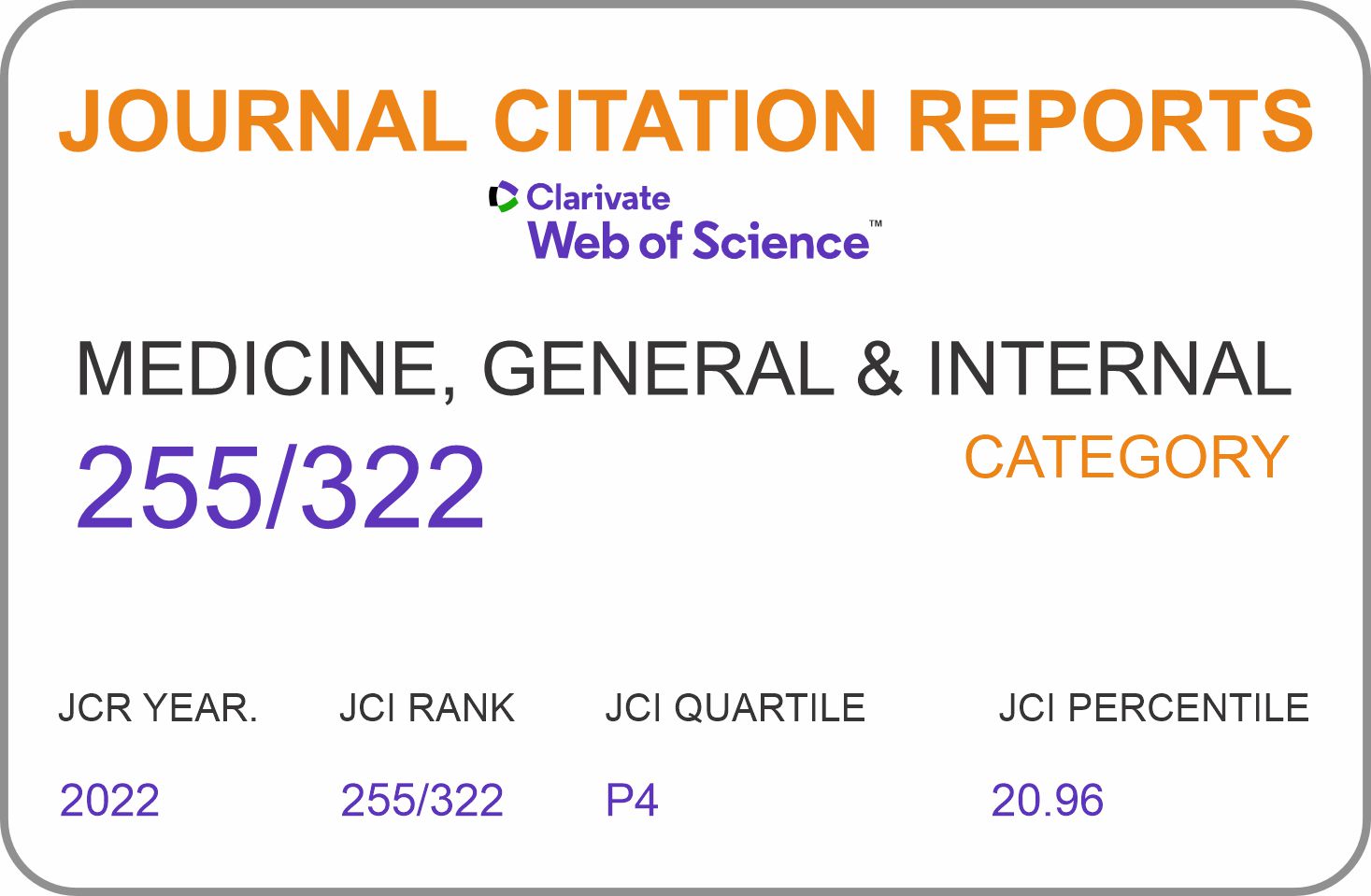Associated factors to a high degree of disability due to tinnitus in the Otorhinolaryngology service’s patients of a Clinic in Lima
DOI:
https://doi.org/10.35434/rcmhnaaa.2023.161.1492Keywords:
Tinnitus, Disability, Hypertension, Depression, THIAbstract
The goal of this investigation was to determine the factors associated with a higher degree of disability due to tinnitus in patients of the otorhinolaryngology service in a clinic in Lima-Peru. The sample consisted of 100 patients who reported suffering from tinnitus, to whom the Tinnitus Handicap Inventory (THI) questionnaire was applied. For the comparative analysis, either the Chi-Square or the Kruskal-Wallis test was used. To determine the association between the study variables, Poisson regression models were used, with 95% confidence intervals. Of the participants, 94% exhibited some degree of disability due to tinnitus. For 40% of the patients the disability was found to be severe. For every subsequent year of age, the probability of suffering from severe disability due to tinnitus increases by 7%, while being hypertensive and having depression increased this probability by 8 and 4.8 times, respectively. In conclusion, age, hypertension and depression are factors associated with a higher degree of disability due to tinnitus.
Downloads
Metrics
References
Deafness and hearing loss [Internet]. Who.int. 2022 [cited 6 April 2022]. Available from: https://www.who.int/news-room/fact-sheets/detail/deafness-and-hearing-loss
Gibrin P, Melo J, Marchiori L. Prevalência de queixa de zumbido e prováveis associações com perda auditiva, diabetes mellitus e hipertensão arterial em pessoas idosas. CoDAS. 2013;25(2):176-180. DOI: 10.1590/s2317-17822013000200014
Marín Marín D, Soto A. Efecto del tinnitus sobre la calidad de vida y sus factores asociados en pacientes adultos. Revista Cubana de Medicina General Integral. 2022;38(2). Disponible en: http://scielo.sld.cu/scielo.php?script=sci_arttext&pid=S0864-21252022000200012
Jarach CM, Lugo A, Scala M, et al. Global Prevalence and Incidence of Tinnitus: A Systematic Review and Meta-analysis. JAMA Neurol. 2022;79(9):888–900. DOI: 10.1001/jamaneurol.2022.2189
Kim H, Lee H, An S, Sim S, Park B, Kim S et al. Analysis of the Prevalence and Associated Risk Factors of Tinnitus in Adults. 2022. DOI: 10.1371/journal.pone.0127578
Santos Filha V, Matas C. Potenciais evocados auditivos tardios em indivíduos com queixa de zumbido. Brazilian Journal of Otorhinolaryngology. 2010;76(2):263-270. DOI: 10.1590/S1808-86942010000200019
Geocze L, Mucci S, Abranches D, Marco M, Penido N. Systematic review on the evidences of an association between tinnitus and depression. Brazilian Journal of Otorhinolaryngology. 2013;79(1):106-111. DOI: 10.5935/1808-8694.20130018
Peña Martínez A. Evaluación de la incapacidad provocada por el tinnitus: homologación lingüística nacional del Tinnitus Handicap Inventory (THI). Revista de otorrinolaringología y cirugía de cabeza y cuello. 2006;66(3). DOI: 10.4067/S0718-48162006000300009
McCombe A, Baguley D, Coles R, McKenna L, McKinney C, Windle-Taylor P. Guidelines for the grading of tinnitus severity: the results of a working group commissioned by the British Association of Otolaryngologists, Head and Neck Surgeons, 1999. Clinical Otolaryngology and Allied Sciences. 2001;26(5):388-393. DOI: 10.1046/j.1365-2273.2001.00490.x
Shargorodsky J, Curhan G, Farwell W. Prevalence and Characteristics of Tinnitus among US Adults. The American Journal of Medicine. 2010;123(8):711-718. DOI: 10.1016/j.amjmed.2010.02.015
Sindhusake D, Mitchell P, Newall P, Golding M, Rochtchina E, Rubin G. Prevalence and characteristics of tinnitus in older adults: the Blue Mountains Hearing Study: Prevalencia y características del acúfeno en adultos mayores: el Estudio de Audición Blue Mountains. International Journal of Audiology. 2003;42(5):289-294. DOI: 10.3109/14992020309078348
Stohler N, Reinau D, Jick S, Bodmer D, Meier C. <p> A study on the epidemiology of tinnitus in the United Kingdom</p>. Clinical Epidemiology. 2019;Volume 11:855-871. DOI: 10.2147/CLEP.S213136
Marková M. (1990). [The cochleovestibular syndrome in hypertension]. Ceskoslovenská Otolaryngologie, 39(2), 89–97. https://pubmed.ncbi.nlm.nih.gov/2350810/
Agarwal S, Mishra A, Jagade M, Kasbekar V, Nagle SK. Effects of hypertension on hearing. Indian J Otolaryngol Head Neck Surg. 2013 Dec;65(Suppl 3):614-8. DOI: 10.1007/s12070-013-0630-1
Wallhäusser-Franke E, Brade J, Balkenhol T, D'Amelio R, Seegmüller A, Delb W. Tinnitus: Distinguishing between Subjectively Perceived Loudness and Tinnitus-Related Distress. PLoS ONE. 2012;7(4):e34583. DOI: 10.1371/journal.pone.0034583
Baigi A, Oden A, Almlid-Larsen V, Barrenäs M, Holgers K. Tinnitus in the General Population With a Focus on Noise and Stress: A Public Health Study. Ear & Hearing. 2011;32(6):787-789. DOI: 10.1097/AUD.0b013e31822229bd
Mazurek B, Szczepek AJ, Hebert S. Stress and tinnitus. HNO. 2015 Apr;63(4):258-65. DOI: 10.1007/s00106-014-2973-7
Reynolds P, Gardner D, Lee R. Tinnitus and psychological morbidity: a cross-sectional study to investigate psychological morbidity in tinnitus patients and its relationship with severity of symptoms and illness perceptions. Clinical Otolaryngology and Allied Sciences. 2004;29(6):628-634. DOI: 10.1111/j.1365-2273.2004.00879.x
Hu J, Xu J, Streelman M, Xu H, Guthrie O. The Correlation of the Tinnitus Handicap Inventory with Depression and Anxiety in Veterans with Tinnitus. International Journal of Otolaryngology. 2015;2015:1-8. DOI: 10.1155/2015/689375
Scott B, Lindberg P, Melin L, Lyttkens L. Predictors of tinnitus discomfort, adaptation and subjective loudness. British Journal of Audiology. 1990;24(1):51-62. PMID: 2317601. DOI: 10.3109/03005369009077842
Downloads
Published
How to Cite
Issue
Section
Categories
License
Copyright (c) 2023 Mariah Santos, Juliana da Fonseca, Edda Evnet Newball Noriega

This work is licensed under a Creative Commons Attribution 4.0 International License.

















